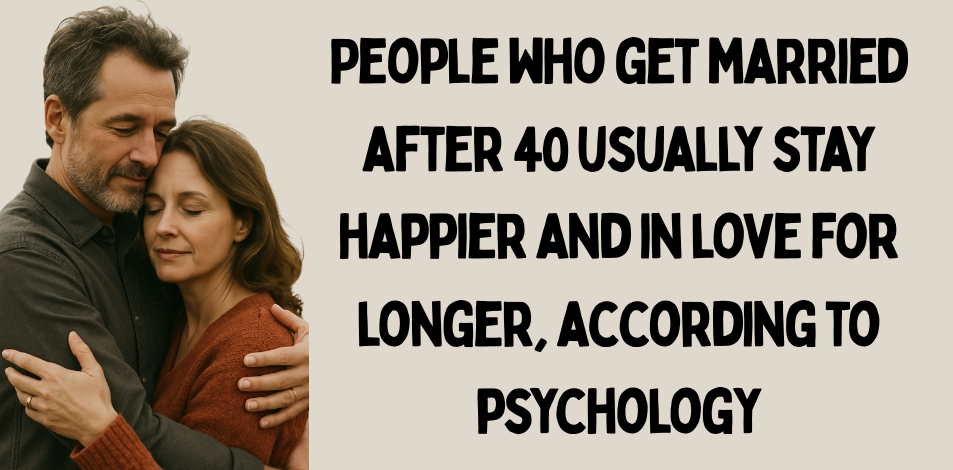
There’s an interesting difference between love and marriage, especially when it comes to timing.
Society often sets an unspoken “best before” date for marriage. But what if I told you that this isn’t necessarily true?
According to psychology, those who choose to marry after 40 tend to stay happier and more in love for longer.
In this article, we’ll explore why waiting is the best path to long-lasting love.
We’ll explore how self-awareness, maturity, and a deeper understanding of individual desires—aspects we tend to improve with age—play a crucial role in building a more fulfilling relationship.
If you’re over 40 and haven’t tied the knot yet, don’t worry. You could be on the right path to a happier, longer-lasting love story.
Let’s get started.
1) Age Brings Emotional Wisdom
When it comes to love and marriage, wisdom doesn’t always come with youth.
As we age, we gain a better understanding of ourselves, our desires, and what truly matters in a relationship.
This emotional intelligence is a powerful predictor of a happy and lasting marriage, especially for those who marry after 40.
Take the advice of world-renowned psychologist Daniel Goleman, author of Emotional Intelligence: “In reality, we have two minds: one that thinks and one that feels. It is the latter that determines our fate, for better or worse.”
It is this emotional mind that matures with age.
As we enter this realm of emotional wisdom, we become more likely to make decisions that align with our true selves.
If you’re over 40 and considering marriage, rest assured. You bring a wealth of emotional knowledge to the table—an essential ingredient for long-lasting love and happiness. It’s not about rushing to conform to societal norms, but rather embracing your emotional maturity.
2) Prioritize Personal Growth
When I was younger, I can’t deny that the idea of marriage seemed like a magic bullet for happiness.
The idea of spending my life with someone was the ultimate goal.
But as I grew older, I realized the value of prioritizing personal growth over entering a serious relationship.
RELATED:7 ways being in a relationship with a narcissist will change you forever, according to psychology
Carl Rogers, the eminent psychologist, once said, “The only person who is truly educated is he who has learned how to learn… and change.”
This understanding revolutionized my outlook on relationships.
It wasn’t about finding someone to complete me, it was about becoming a complete person.
By the time I married at 42, I had acquired a rich body of experiences and personal growth that made me a better partner.
I was more patient, more understanding, and more self-aware—traits essential for maintaining a healthy and loving relationship.
Marriage after 40 isn’t a delay, but rather an opportunity for personal growth that greatly enhances your marital happiness.
3) Appreciate the depth of companionship
Are you afraid that marrying later might mean missing out?
Let me share something personal. I’ve had different experiences. I married young and experienced love late.
And let me tell you, there’s a clear difference between the two.
Psychologist Carl Jung once said, “The meeting of two personalities is like the contact of two chemicals: if any reaction occurs, both are transformed.”
In my first marriage, I was obsessed with the idea of passionate love. The heartbeat, the intense emotions—we all know those feelings.
But over time, I realized that these intense emotions are temporary and often lead to conflict.
Fast forward to my second marriage after turning 40. The love I experienced was different. It was deeper, calmer, and more grounded in companionship. We weren’t just lovers, but close friends who respected and understood each other.
Marrying after 40 allowed me to appreciate the depth of this companionship, rather than chasing fleeting feelings.
Believe me, it’s a beautiful experience that contributes to building a happier, more loving relationship in the long run.
4) Greater Financial Stability
Marrying later often means greater financial stability, a factor that significantly impacts a marriage’s happiness and longevity.
Financial disputes are a strong predictor of divorce.
From my personal experience, marrying later allowed me to establish a solid financial position.
I had a stable career, savings, and a clear understanding of my financial goals.
This financial stability formed a solid foundation for my relationship, reducing the likelihood of financial disputes.
Marrying after 40 means fewer financial disputes and a greater focus on nurturing love and happiness in your relationship.
5) Embrace True Love
Marrying later taught me the true meaning of love. It’s not about grand gestures or the fairytale love stories we often see in movies.
It’s about honesty, mutual respect, and deep understanding.
The renowned psychologist Erich Fromm captured this brilliantly in his book, “The Art of Loving.”
He wrote: “Love isn’t natural. It requires discipline, focus, patience, faith, and overcoming narcissism. It’s not a feeling, it’s a practice.”
In my 40s, I learned to practice love. I understood that love is about being there for each other through thick and thin, accepting each other’s flaws and celebrating our differences.
This true love is more satisfying and lasting than any youthful passion.
If you’re planning to get married after 40, remember that you’re entering a world where love isn’t just a feeling, but a practice—a practice that will keep your relationship happier and stronger for years to come.
6) Embrace Solitude Before Getting Together
Here’s something that might seem counterintuitive: Spending time alone is actually beneficial for your future marriage.
Before I got married after 40, I spent years of solitude that helped me appreciate my own company.
It may sound solitary, but the truth is, it was an enlightening period of self-discovery.
As psychologist Rollo May says, “To be open to creativity, one must have the ability to use solitude constructively. One must overcome the fear of being alone.”
This period of solitude allowed me to understand my strengths and weaknesses, my likes and dislikes.
It gave me the confidence to be myself and not depend on someone else for my happiness.
When I got married, I brought this sense of self-awareness into my relationship. It made me a better partner because I understood myself and felt comfortable in my own skin.
As a result, our relationship was built on mutual respect and understanding, rather than dependence.
If you’re getting married after 40, cherish your years of solitude.
They’re not a sign of loneliness, but rather a testament to your growth and self-awareness—traits that will contribute greatly to a happy and lasting marriage.
7) Foster True Acceptance
Perhaps the greatest gift of marrying later in life is the ability to accept your partner, with all their flaws.
As we grow older, we learn that no one is perfect, and that’s normal.
We understand that love doesn’t mean changing our partner, but rather accepting them as they are.
The renowned psychologist Carl Jung once said, “The most terrifying thing a person can do is accept themselves completely.”
Marriage after forty allows us to accept not only ourselves, but also our partner.
This true acceptance lays the foundation for a secure, lasting, and loving relationship. It’s a wonderful testament to the power of mature love.
Concluding Thoughts
The journey of love and marriage is inextricably linked to our personal growth and understanding.
Choosing marriage after 40 is not a postponement, but rather an embrace of self-discovery, emotional wisdom, and true love.
It’s about appreciating the depth of companionship, fostering financial stability, and building a relationship based on true acceptance.
These thoughts gently remind us that there is no set timeline for love. Every journey is unique and must move at its own pace.
So, if you’re over 40 and considering marriage, take heart. Your path may lead you to a deeper, richer, and more fulfilling love.
It’s a testament to the beauty of mature love, a love that grows stronger with time.
Because sometimes life’s greatest joys are worth waiting for.




